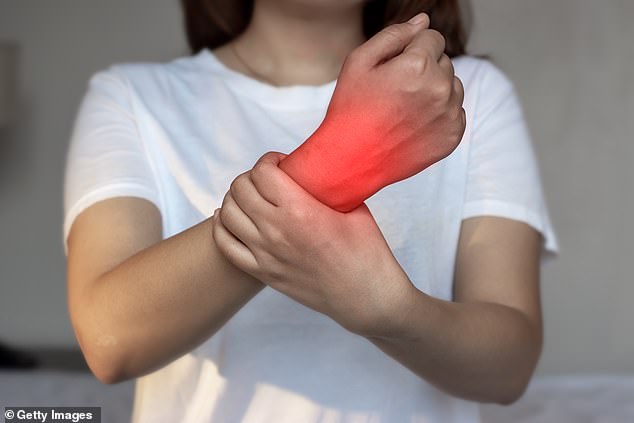Night cramps cause misery for millions. But now there’s a PROVEN cure… and it’s a very surprising cheap over-the-counter pill: DR SCURR
Night cramps are a problem that readers often ask me about – it is a common complaint and so far I have not been able to recommend an effective treatment.
But a study published in JAMA Internal Medicine found that vitamin K2 (also known as menaquinone) significantly reduced both the frequency and severity of cramps in adults over 65, without side effects. Finally we have something to recommend.
Vitamin K2 (also known as menaquinone) significantly reduced both the frequency and severity of cramps, without side effects, in adults over 65 years of age
However, there is one caveat: it should not be taken if you are taking warfarin, as this drug works by blocking vitamin K, which plays a key role in blood clotting. Vitamin K2 is available without a prescription – in the study, patients took one 200 mcg capsule per day.
——————————————– —- —————————
After a Giardia infection, I appear to have reactive arthritis, which makes it difficult for me to walk and has swollen, painful wrists. My doctor has offered me steroids but says it should be my decision because of the side effects.
James Chalmers, Cheshire.
Dr. Martin Scurr replies: Giardia is a parasite that occurs in water. Giardia infection (or giardiasis) is the most common waterborne stomach bug worldwide, but you don’t have to swallow or be in contaminated water to contract it: you can get it by eating food washed in contaminated water.
Symptoms include diarrhea, abdominal pain and nausea, although some people show no signs of infection.
Although it usually resolves within a week with treatment (antibiotics), it can sometimes last for months, even years, causing complications such as gastrointestinal upset, bloating, weight loss – and even arthritis.

‘Reactive’ arthritis is caused by inflammation in the joints in response to an infection
This is known as ‘reactive’ arthritis and is caused by inflammation in the joints in response to an infection. In your longer letter you mention increased inflammatory markers, which are a sign of this ongoing effect.
You’re lucky your doctor noticed this because it’s not something that’s normally on our radar.
I have seen many patients with Giardia infection, but have never encountered ‘reactive’ arthritis as a complication.
Yet a 2017 study concluded that it is more common than reported, showing that patients who had had giardiasis had a 50 percent greater risk of arthritis or joint pain. Because your symptoms are negatively affecting your quality of life, I agree with your doctor that suppressing inflammation with steroids is worth it.
Hopefully you will be symptom free soon, possibly within a few weeks, and the steroids can be reduced gradually.
Don’t be too concerned about the side effects of steroids – unless you already have other contraindications, such as high blood pressure or type 2 diabetes. Strategies to reduce the potential impact include medication to reduce stomach irritation, plus calcium and vitamin D supplements to help combat the risk of osteoporosis.
Once during treatment, your inflammatory markers will be monitored, along with a careful diary of your symptoms, so the dose can be adjusted. Whether this treatment would last weeks, months, or even a year remains to be seen – and why a program to reduce any side effects would be important.
——————————————– —- —————————
I was prescribed atorvastatin, clopidogrel and lansoprazole after a stroke two years ago. I feel like the atorvastatin is affecting my balance and I would like to reduce my dose. I already stopped taking lansoprazole because I thought it was giving me diarrhea, but what do you think?
Vernon Sharp, Ashford, Kent.
Dr. Martin Scurr replies: This drug combination will be familiar to many people who have had an ischemic stroke, in which a blood clot or other blockage cuts off blood flow to part of the brain.
Clopidogrel and atorvastatin are prescribed to reduce the risk of another stroke.
Clopidogrel prevents small blood cells called platelets from sticking together and forming a clot. Atorvastatin, a statin, lowers cholesterol and the risk of fatty deposits or plaques in the arteries. If a piece of plaque breaks off, this can lead to clot formation or the blood vessels can immediately become blocked.
Dizziness or unsteadiness, as side effects of statins are rare. They may result from damage caused by your stroke.
Lansoprazole reduces the production of stomach acid, to minimize irritation of the stomach lining caused by clopidogrel, thus reducing the risk of bleeding.
It is possible for lansoprazole to cause diarrhea – and stopping it to see if that helps does not have as serious consequences as stopping the statin; as you have already done, and if stopping has helped, it is worth restarting the lansoprazole to see if the side effect occurs again.
Regarding your balance, I recommend that you ask for a referral to a physiotherapist.
